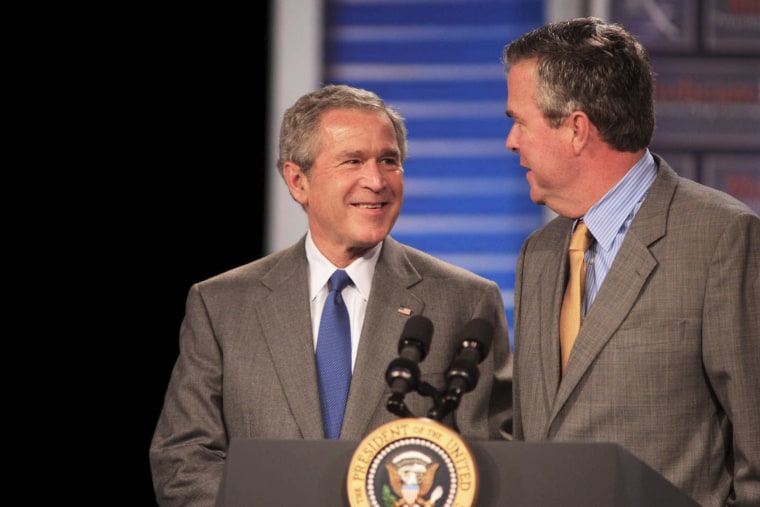When Jeb Bush started receiving foreign-policy advice from Condoleezza Rice, the Republican candidate's team reportedly felt some "
sensitivity" about the discussions. Team Jeb worried about sending a signal to the public that the former Florida governor "would be a carbon copy of his brother's administration."
Yesterday, this dynamic grew even more serious with a
new report from the
Washington Post.
When asked this week at an exclusive Manhattan gathering about who advises him on U.S.-Israel policy, Jeb Bush surprised many of the 50-plus attendees by naming his brother, former president George W. Bush, as his most influential counselor. "If you want to know who I listen to for advice, it's him," Bush said Tuesday, speaking to a crowd of high-powered financiers at the Metropolitan Club, according to four people present.
Americans learned in March that
practically every member of Jeb Bush's foreign policy team worked for his father, brother, or both, but these new revelations take matters further -- the former governor now says he's getting advice on foreign policy from George W. Bush directly.
Perhaps the most obvious problem is the inherent contradiction of Jeb Bush's message. On the one hand, the 2016 candidate is eager to tell voters, "I am my own man." On the other hand, the Florida Republican has relied heavily on his family for fundraising; he's hired his family's advisers to staff his political operation; and now he's boasting about turning to his brother for guidance on U.S. policy towards Israel.
There is literally nothing about this arrangement that suggests Bush is his "own man."
There's also the problem with the adviser himself -- George W. Bush, whatever one might think of him, did not exactly excel when it came to foreign policy in the Middle East. Presidential hopefuls would generally be wise to do the opposite of everything he suggests.
But let's not overlook the one less obvious problem, which seems to be generating far less attention.
Dan Drezner, a center-right foreign policy expert, picked up on
the under-appreciated angle: "[T]he problem George W. Bush poses for Jeb is that the current GOP donor base could think that Bush 43 was soft on Israel."
That's crazy talk, I know. After all, Bush was known for being a stalwart friend of Israel while in office. He backed Israel to the hilt during that country's 2006 operations against Hezbollah. [...] And yet… Bush did not always see eye-to-eye with Israel. He characterized himself as the first president to state that he supported a Palestinian state... Bush actually convened a peace conference between Israeli leaders and the Palestinians. He refrained from bombing Syria in 2007 to stop that country’s nascent nuclear program, forcing Israel to go it alone in that attack. Bush later refused to support an Israeli airstrike on Iran in the spring of 2008. Bush was clearly a strong supporter of Israel, and yet that support was not completely unqualified.
I agree, though Drezner might even be understating the case a bit. Back in 2005, for example, George W. Bush also disagreed with Israel
on new settlements in the West Bank.
At the time, these disputes between the Bush/Cheney administration and Israeli officials weren't considered scandalous, but the political winds have shifted in recent years. In Republican politics in 2015, any disagreement with Israel on any issue is generally considered unacceptable. The fact that George W. Bush's foreign policy occasional diverged from Israel's preferred course would simply not be tolerated by his party's current standards.
Which is why Jeb Bush's comments this week matter more than might be obvious on the surface. Whether he meant to do this or not, the Florida Republican was effectively telling GOP donors that when it comes to Israel, his top adviser sometimes thought Israel was ... wrong.
Will the party demand an explanation or an apology?
